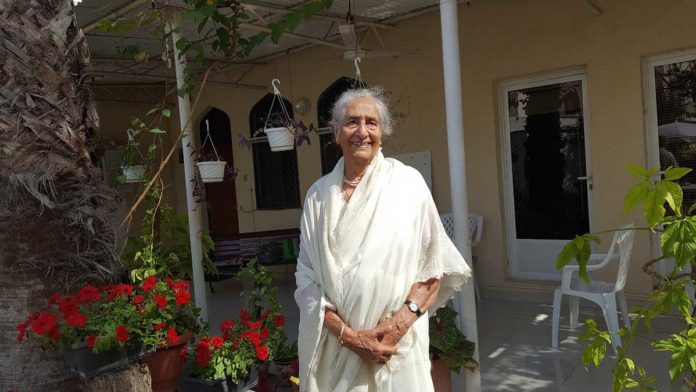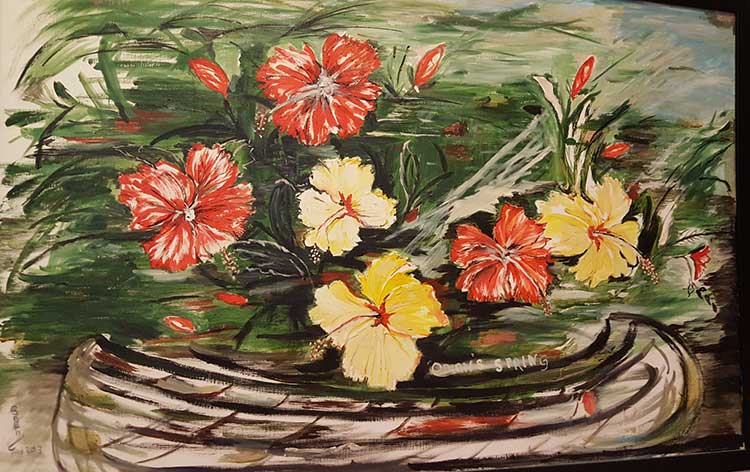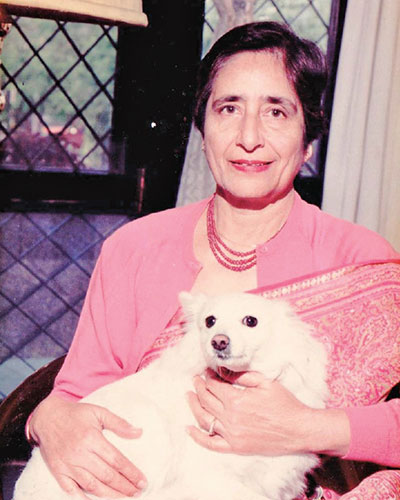“I led a very secluded life,” muses Sneh Sunder, as she settles down in her backyard to narrate her life story, which has, paradoxically, witnessed the chaotic days of World War II and the aftermath of partition between India and Pakistan. “I was brought up in a very old fashioned manner…there was nothing modern about us,” she continues, in a clear modulated voice that belies her age, which she points out, later, as 86!
Dressed in an elegant off-white sari, she carries an aura of contentment, which, obviously, stems from her treasure box of pleasant memories that marked her early childhood and shaped her enduring passion for creative pursuits and a desire to connect with people around her. While the latter is obvious in the coterie of friends she has made in her neighbourhood here, hints of her creativity are spread all over the house and her garden,w which is resplendent with flowering shrubs, vegetable patches and the quintessential lime tree.
The cool winter breeze and the chirping birds in the garden present a perfect setting for a nostalgic trip down the memory lane. And as Sneh continues to reminisce about her early childhood and self-inspired growth in the field of art, there is an overwhelming desire to disengage from the present and go back in time to piece her words with sepia-toned visuals.
Born and brought up in Ranchi, India, life was a flow of simple events, governed more by nature, as they lived in the forest area (her father was a forest officer). There was only one school in the locality; but following the World War II in 1939 that school too was gradually turned into a hospital, limiting education to private tuitions.
Around this time, Loreto Convent nuns came from Calcutta and opened a school in one of the private homes that was previously occupied by an English lady – most of them had returned back to their hometowns with the onset of war. Sneh completed her Junior Cambridge and Senior Cambridge at this coeducational school, but had to leave home soon after, as there was no college in Ranchi. It was decided that she would go to Lady Irwin in Delhi. The year was 1947 and the time coincided with India-Pakistan partition…
Sneh can vividly recall that period of her life as if it happened just recently. Narrating the turn of events when they landed in Delhi, she points out that they were not aware that the partition had taken place… There was curfew and they couldn’t leave the old Delhi station, where they were stuck for three days. “The army officer with whom I travelled was trying his level best to get us out,” she recalls, pointing out that a cousin, who was in the Indian Army Corps of Signals, somehow managed to get them out.
At the college, the students were required to work round the clock to cook for the refugees. “All of us who could cook and make rotis were left in the college,” she adds, pointing out that the senior students were, at the request of Lady Mountbatten, asked to join the Red Cross and care for the hospital patients.
Soon Sneh became the editor of the college newspaper, which she called ‘Renaissance’, and her long tryst with writing found a firm footing. She also took up special classes to give vent to her passion for drawing and painting. However, reflecting on her domestic science course at college, she quips: “I thought it a complete waste as we were well trained in the house by our mother who drove us crazy teaching cooking and all the housework.”
Used to the archaic way of life, they made do without electricity during the early years. “That is the simple life we were brought up in,” she sighs. She lived in Ranchi till her marriage in 1954, following which she came to Delhi “and to civilization”, she chuckles.
Pan to the present and she is filled with a sense of total contentment. Sipping ‘nimbu paani’ (lemonade) made from the limes in her garden, she contemplates on the old days and draws a parallel with her life now. Oman happened when her son Sumanth took up a posting here in the early 1990s and she found an immediate connect with the land and the people. And since, Oman has become her second home. “I am here more than I am in Delhi,” she muses. Her youngest son lives in Delhi with his wife and two sons and her daughter is in Chicago with her family.
“That’s my story… People here are lovely… They keep me feeling young and loved and I am very happy and very proud,” states Sneh, who brings a fresh whiff of old charm to every activity she indulges in, even making pickles and jams with her friends.
Up Close & Personal With Sneh Sunder
The home I grew up in… Was in Ranchi. There used to be lovely old homes with huge gardens and every six miles out of Ranchi was a picnic spot. As my father was a forest officer, we accompanied him on the big shoots with British guests… Those days there were no cinemas and no restaurants; even cakes and pastries were homemade. There were no boutiques and tailors came by to take our orders. Nobody had phones…we were all made to write. I am still in the habit of writing letters to all my friends. I draw my own cards. I don’t use computers; I don’t know how.
When I was a child I wanted to… Be a vet. My cousin and me didn’t want to get married – we wanted to take care of animals. During those days in Ranchi there was a blind school and a place for animals. On weekends my mother used to send us to give food to the blind children and once or twice a month, during holidays, we worked in the veterinary place.
The moment that changed me forever… I suppose marriage, because I didn’t ever think I would get married to a Punjabi, having lived in Bihar all my life. I did not know Punjabi or the customs. My mother wasn’t very keen, but my aunt and uncle had given their word and that was the end of it.
My greatest inspiration… I have been greatly inspired by all the people I met; one of them was Major Osmani, who was a very close family friend.
My hero… My hero was my oldest brother Amrith. He was like a father figure after my father passed away.
If I could change one thing about myself… Nothing. I have adjusted myself to everyone, easily.
I dream of… Dying peacefully.
What I see when I look in the mirror… I don’t look in the mirror anymore.
My greatest regret… Nothing. I am very well taken care of by my children, in every sense of the word.
You may not know it but I’m no good at… Many things.
You may not know it but I’m very good at… Nothing.
If I have time to myself… I write letters, or write some part of my life.
My favourite holiday destination… Muscat – it’s both a home and a holiday destination.
I will not leave my house without… My medicines.
Things I like about Oman… Everything…the place, the house, the people and the environment.
On top of my wish/bucket list is… Everything I wished for has been given to me by God’s grace.
My success mantra is… Keep busy… I think the Gayatri Mantra keeps me going.



